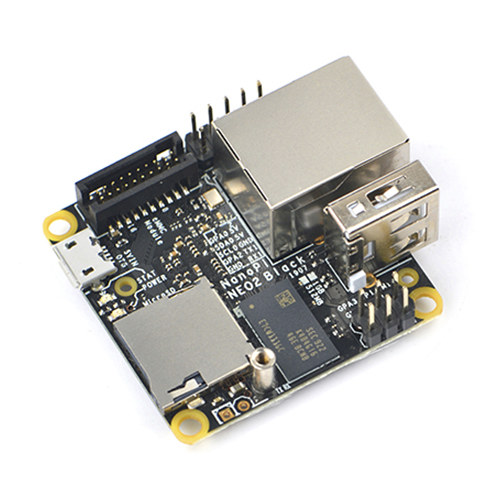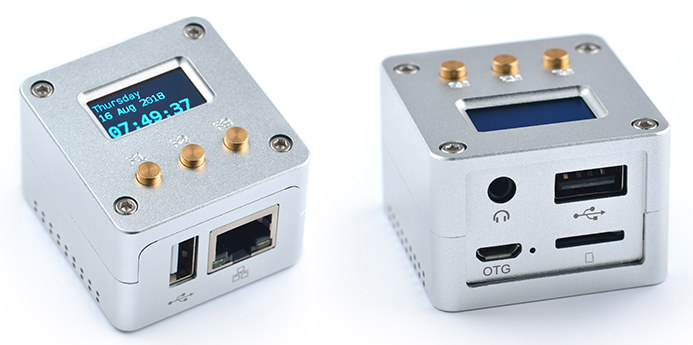NanoPi NEO2 Black is an Allwinner H5 SBC designed for headless applications that improves on the existing NanoPi NEO2 board by adding an eMMC flash module support, and higher memory capacity (up to 1GB RAM).
The board was announced last month, but it’s now available for purchase for $19.99 plus shipping on FriendlyElec website.
 Here’s a reminder of the specifications:
Here’s a reminder of the specifications:
- SoC – Allwinner H5 quad-core Cortex A53 processor with an ARM Mali-450MP GPU
- System Memory – 1GB DDR3
- Storage – MicroSD card slot, eMMC flash module connector
- Connectivity – Gigabit Ethernet (via RTL8211E-VB-CG chip)
- USB – 1x USB 2.0 host port, 1x micro USB OTG port, 1x USB via headers
- Expansion headers
- 10-pin header with I2C, UART, GPIOs, and power signals (5V in/out + GND)
- 6-pin header with 1x USB, Line Out (stereo), 1x GPIO
- Debugging – 2-pin unpopulated header for serial console / debugging
- Misc – Power and system LEDs
- Power Supply – 5V via micro USB port or VDD pin on headers.
- Dimensions – 40 x 40 mm
- Weight – ~16 grams
NanoPi NEO2 Black supports Ubuntu 18.04 (FriendlyCore) and OpenWrt (FriendlyWrt) and you’ll find all you need to get started on the Wiki. Armbian is also already supported.
 Beside the board itself, there are some interesting accessories including:
Beside the board itself, there are some interesting accessories including:
- $2.97 heatsink
- $9.95 – $28.95 8GB to 64GB eMMC flash module
- $4.99 machine-cut black metal case
- $39 CNC Metal case kit including NEO2 Black board, 16GB micro SD card and OLED Display as pictured above.
$12.99 NAS Kit v1.2 to convert it into a 2.5″ SATA drive NAS- Various NanoHAT add-on modules
So there are plenty of applications possible for the tiny board from networked storage to automation gateway, various IoT projects thanks to NanoHAT sensor modules, smart speaker, or networked music player. Existing projects based on NanoPi NEO & NEO2 should be easily ported to NanoPi NEO2 Black, and in many cases there may not be anything to change at all.

Jean-Luc started CNX Software in 2010 as a part-time endeavor, before quitting his job as a software engineering manager, and starting to write daily news, and reviews full time later in 2011.
Support CNX Software! Donate via cryptocurrencies, become a Patron on Patreon, or purchase goods on Amazon or Aliexpress




